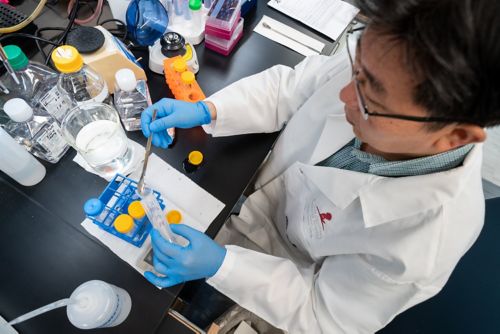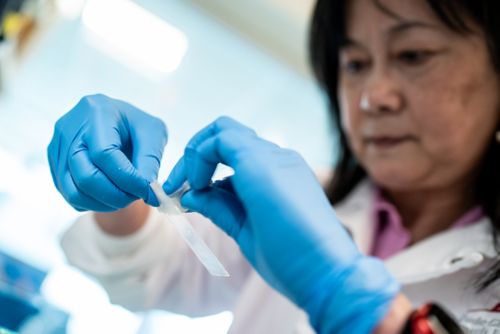St. Jude Family of Websites
Explore our cutting edge research, world-class patient care, career opportunities and more.
St. Jude Children's Research Hospital Home

- Fundraising
St. Jude Family of Websites
Explore our cutting edge research, world-class patient care, career opportunities and more.
St. Jude Children's Research Hospital Home

- Fundraising
Center of Excellence in Neuro-Oncology Science
Suzanne Baker Lab
Deciphering the pathogenesis and therapeutic vulnerabilities of pediatric high-grade glioma
About the Baker Lab
Brain tumors are the leading cause of cancer-related death in children, and pediatric high-grade glioma (pHGG) is one of the most devastating brain tumors of childhood. Our laboratory analyzes pHGG patient tumor samples and establishes genetically engineered and patient-derived models for studies to understand connections between chromatin regulation, developmental signaling pathways and tumorigenesis in the brain. Our goal is to enhance the mechanistic understanding of HGG and identify therapeutic vulnerabilities for patient benefit in the clinic.

Learn more
Like kisMET: targeted therapy and radiation synergize in pediatric high-grade glioma
Translational research from Suzanne Baker, PhD, and colleagues shows that targeted MET inhibitor capmatinib effectively crosses the blood-brain-barrier, synergizing with radiation to treat pediatric high-grade glioma.
Our research summary
The genomic landscape of pHGG reveals a spectrum of mutations closely associated with patient age and tumor location, highlighting a critical interplay between developmental context and gliomagenesis in children. Our group co-discovered histone H3 mutations in pHGG, identifying H3 K27M mutations in nearly 80% of diffuse intrinsic pontine glioma (DIPG) and H3.3 G34R/V mutations in cortical pHGG at lower frequency. This was the first clear evidence of distinct molecular subgroups of pHGG and indicated indicates that dysregulation of the epigenome contributes to this particular disease. The World Health Organization has changed the classification of pHGGs to specify these subgroups as diffuse midline glioma, H3K27-altered and diffuse hemispheric glioma, and H3G34 mutant in recognition of their unique molecular and clinicopathologic features. Our current research on pHGG tumor biology addresses critical questions spanning cell type and developmental context, epigenetic dysregulation and tumor cell plasticity and heterogeneity.
Molecular mechanisms of pediatric HGG
We established a large collection of patient-derived xenograft models shared with the research community through pbtp.stjude.cloud. These powerful models are complemented by genetically engineered models, primary cultures of patient-derived cell lines and organoids for mechanistic studies and preclinical testing of targeted therapies. Complex data sets from RNA-seq, single cell profiling, ChIP-seq, and additional platforms are integrated to examine relationships between epigenetics and gene expression changes underlying tumor biology. We dissect mechanisms through molecular, biochemical and imaging approaches coupled with gene editing, knockdown or chemical inhibition to introduce pHGG mutations or disrupt critical pathways in these model systems.

Connections between brain tumors and CNS development
A pressing research question is why recurrent point mutations in histone H3 cause region-specific cancer growth in the developing brain. We leverage model systems that faithfully recapitulate developmental context to investigate the functional consequences of pHGG-associated mutations. We investigate different cell populations and developmental time points to determine how these mutations affect development, cell lineages and cell states. In parallel, we examine pHGG-associated mutations and pathway perturbations to identify molecular signatures, impact on glioma growth and potential therapeutic vulnerabilities.

Novel therapeutic targets for pediatric patients with HGG
We are following up on findings from mechanistic studies and screens to identify selective vulnerabilities as candidates for targeted molecular therapies. Our large collection of patient-derived xenograft models is leveraged for preclinical testing to address the urgent need for targeted treatments to improve patient outcomes for these devastating brain cancers.
Selected publications
Contact us
Suzanne J. Baker, PhD
Member, Center of Excellence in Neuro-Oncology Sciences
Department of Developmental Neurobiology
Endowed Chair in Brain Tumor Research
Co-Leader, Neurobiology and Brain Tumor Program
Deputy Director, St. Jude Comprehensive Cancer Center
MS 323, Room M3412
St. Jude Children's Research Hospital

Memphis, TN, 38105-3678 USA GET DIRECTIONS

